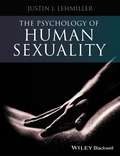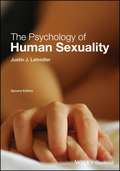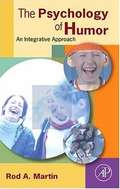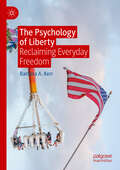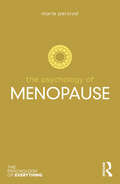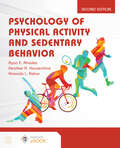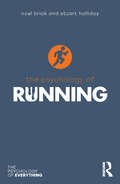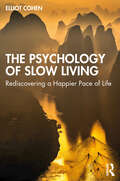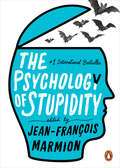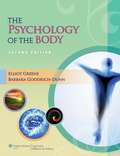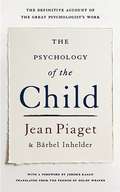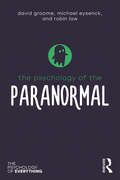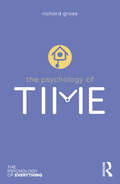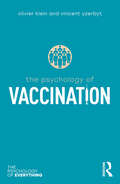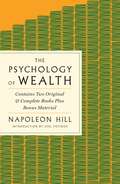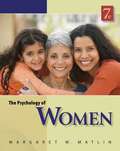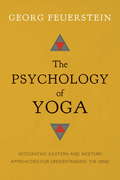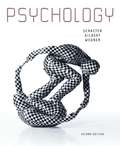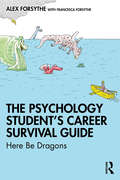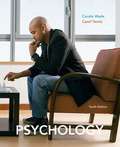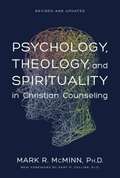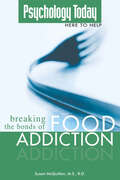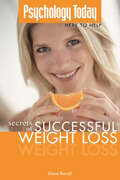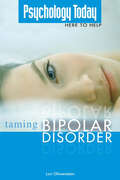- Table View
- List View
The Psychology of Human Sexuality
by Justin J. LehmillerThis book offers a comprehensive overview of human sexual behavior from a biopsychosocial perspective.
The Psychology of Human Sexuality
by Justin J. Lehmiller<p>The thoroughly revised and updated second edition of The Psychology of Human Sexuality explores the roles that biology, psychology, and the social and cultural context play in shaping human sexual behavior. The author – a noted authority on the topic and an affiliate of the acclaimed Kinsey Institute - puts the spotlight on the most recent research and theory on human sexuality, with an emphasis on psychology. <p>The text presents the major theoretical perspectives on human sexuality, and details the vast diversity of sexual attitudes and behaviors that exist in the modern world. The author also reviews the history of sexology and explores its unique methods and ethical considerations. Overall, this important and comprehensive text provides readers with a better understanding of, and appreciation for, the science of sex and the amazing complexity of human sexuality.</p>
The Psychology of Humor: An Integrative Approach
by Rod A. MartinResearch on humor is carried out in a number of areas in psychology, including the cognitive (What makes something funny?), developmental (when do we develop a sense of humor?), and social (how is humor used in social interactions?) Although there is enough interest in the area to have spawned several societies, the literature is dispersed in a number of primary journals, with little in the way of integration of the material into a book. Dr. Martin is one of the best known researchers in the area, and his research goes across subdisciplines in psychology to be of wide appeal. This is a singly authored monograph that provides in one source, a summary of information researchers might wish to know about research into the psychology of humor. The material is scholarly, but the presentation of the material is suitable for people unfamiliar with the subject-making the book suitable for use for advanced undergraduate and graduate level courses on the psychology of humor-which have not had a textbook source
The Psychology of Liberty: Reclaiming Everyday Freedom
by Barbara A. KerrThis book introduces a new concept of liberty, based on the idea that being free means being the humans we evolved to be in our first 200,000 years. With perspectives from psychology, anthropology, and sociology, the author shows how throughout history, dominant individuals and status hierarchies have injured our psychological and physical well-being. Readers discover simple behaviors that make humans feel free (like gossiping, playing, making, and storytelling) and are prompted to a compelling reflection threats to this freedom. Psychology of Liberty: Reclaiming Everyday Freedom explores the dynamics of creative families, communities, and societies, showing how they sustain human freedom. The author identifies new pathways to freedom, drawing from examples of resistance to authoritarianism. In this timely and ambitious book, the author combines personal narrative with academic research to make complex ideas accessible.
The Psychology of Melancholy
by Mortimer OstowDescribes the symptoms of depression and the subconscious steps victims often take to stave it off.
The Psychology of Menopause (The Psychology of Everything)
by Marie PercivalWhat physical and psychological changes can I expect when going through the menopause? How can I protect my well-being during menopause? How can I ensure a good menopause experience?The Psychology of Menopause provides a useful and positive guide to understanding the psychological, social, and sexual changes that occur during and following menopause. Going beyond hot flushes and HRT, it focuses on how to enhance psychological well-being by looking at the science behind women's lived experiences of perimenopause and postmenopause. The book explores key psychological issues during this transition, such as the risk factors associated with mood and anxiety, the changing social and personal roles for women in midlife, the impact on relationships, and the reasons for brain fog.By putting women’s psychological well-being at the heart of this stage of life, The Psychology of Menopause provides a much-needed examination into the psychological, social, cultural, and interpersonal aspects of the transition into and beyond menopause.
Psychology of Physical Activity and Sedentary Behavior
by Ryan E. Rhodes Heather A. Hausenblas Amanda L. RebarWritten for the upper-level undergraduate and graduate-level courses in exercise psychology and behavioral physical activity, Psychology of Physical Activity and Sedentary Behavior, Second Edition focuses on the psychological effects of physical activity in a diverse array of populations. It emphasizes how physical activity needs to be paired with a reduction in sedentary behavior in order to achieve overall health. With a focus on both the psychology of exercise and sedentary behavior, this first-of-its kind text provides readers with the latest research in both areas, including coverage of sleep, pain, and delayed gratification. This text also applies a critical lens to foundational theories and incorporates applications and interventions throughout.
The Psychology of Running (The Psychology of Everything)
by Noel Brick Stuart HollidayWhy do people run? How can I improve my running performance? Will running help me feel better? The Psychology of Running provides a unique insight into why running is such a popular form of exercise and competition. From evolutionary perspectives on why humans have needed to run and how our bodies have adapted for this function, to discussing evidence-based interventions that can improve running performance, the book delves into the psychological motivations and benefits of running. The book also considers ways in which running can be used for social change and life skill development, highlighting how such a simple activity can have benefits for our physical and mental health. Providing proven psychological strategies and techniques to help improve running performance and boost our individual self-belief, The Psychology of Running shows us how we can enjoy running, no matter our age or ability.
The Psychology of Slow Living: Rediscovering a Happier Pace of Life
by Elliot CohenThis fascinating book explores the concept of slow living, offering a philosophical and psychological exploration of the need for a slower pace of life. It advocates for reclaiming and rediscovering more natural and human ways of being.In a digital age, which is dominated by an increasingly tyrannical trinity of speed, efficiency and productivity, the author challenges the pernicious ideal of instant gratification, perpetuated by modern consumer culture. This book examines alternative ways of being through re-examining the Wisdom Traditions of Hinduism, Buddhism, Daoism and Judaism through an ongoing and engaging dialogue with psychology and psychotherapy, including insights from environmental psychology, ecopsychology and cyberpsychology. The book argues against the trend for personal responsibility, adaptability and resilience, and the idea that stress is the ‘new normal'. Instead, it proposes a radical shift in paradigm, promoting not for collectively rising up and overthrowing this system but for communally sitting down and reimagining.The Psychology of Slow Living is a unique exploration of the benefits of the slow living movement and taps into contemporary debates around the way we should be living our lives, making it an ideal resource for students and academics in psychology, philosophy and the social sciences, as well as individuals interested in alternative lifestyles and spirituality.
The Psychology of Stupidity
by Jean-Francois Marmion Liesl Schillinger"We need books like this one." --Steven PinkerAt last, stupidity explained! And by some of the world's smartest people, among them Daniel Kahneman, Dan Ariely, Alison Gopnik, Howard Gardner, Antonio Damasio, Aaron James, and Ryan Holiday.And so I proclaim, o idiots of every stripe and morons of all kinds, this is your moment of glory: this book speaks only to you. But you will not recognize yourselves...Stupidity is all around us, from the coworker who won't stop hitting "reply all" to the former high school classmate posting conspiracy theories on Facebook. But in order to vanquish it, we must first understand it. In The Psychology of Stupidity, some of the world's leading psychologists and thinkers--including a Nobel Prize winner and bestselling authors--will show you... • why smart people sometimes believe in utter nonsense; • how our lazy brains cause us to make the wrong decisions; • why trying to debate fools is a trap; • how media manipulation and Internet overstimulation make us dumber; • why the stupidest people don't think they're stupid.The wisdom and wit of these experts are a balm for our aggrieved souls and a beacon of hope in a world of morons.
The Psychology of the Body (LWW Massage Therapy and Bodywork Educational Series)
by Elliot Greene Barbara Goodrich-DunnThe Psychology of the Body provides massage therapists, bodyworkers, and other professionals who use contact with the body with a greater understanding of the psychological issues that can arise from using touch in their therapy sessions. This new edition continues to provide a crucial basis of knowledge for students, recent grads, and experienced therapists alike regarding the emotional impact of effective therapy. The book describes the connection between the body and the mind, how touch affects this connection, the client's emotional reaction and release, and how to respond to the client in an appropriate manner. With a new, more colorful layout, this new edition has 50% more content and has been fully revised to address the latest science around this topic. For instructors, prepare your students to appropriately identify, understand, and respond appropriately to all aspects of the therapeutic relationship, including the phenomenon of emotional release, dealing with boundaries, effective interpersonal communications, and a body-based approach to ethics. Furthermore, in-text features aim to help students apply their learning to actual practice. Teaching resources like power point presentations, lesson plans, and tests with answer keys are available.
The Psychology of the Child
by Jean Piaget Barbel InhelderPiaget’s influence on psychology has been profound. His pathbreaking investigations and theories of cognitive development have set child psychology moving in entirely new directions. His bold speculations have provided the inspiration for the work of others. His studies have been the subject of many books and countless articles. And, significantly, his influence has spread to other disciplines and is having an ever-growing impact on the general culture at large.Here Jean Piaget, with the assistance of his long-time collaborator Bärbel Inhelder, offers a definitive presentation of the developmental psychology he has elaborated over the last forty years. This comprehensive synthesis traces each stage of the child’s cognitive development, over the entire period of childhood, from infancy to adolescence.
The Psychology of the Paranormal (The Psychology of Everything)
by David Groome Michael Eysenck Robin LawCan mediums communicate with the dead? Do people really believe they’ve been abducted by aliens? Why do some people make life decisions based on their horoscope? The Psychology of the Paranormal explores some commonly held beliefs regarding experiences so strange they can defy an obvious scientific explanation. The book explains how psychologists have conducted experiments to provide insight into phenomena such as clairvoyance, astrology, and alien abduction, as well as teaching us fundamental truths about human belief systems. From debunking myths about Extra Sensory Perception, to considering whether our lives can truly be fated by the stars, The Psychology of the Paranormal shows us that however unlikely, belief in the paranormal will continue to be widespread.
The Psychology of Time (The Psychology of Everything)
by Richard GrossWhat is the meaning of time? Do we have an internal clock? Can time speed up or slow down?The Psychology of Time considers how we define, describe, and experience time. From a discussion of how our language around time is dependent on metaphor, to the role of biology in controlling our bodily experience of time, the book delves into how the finitude of life is a given human experience. It looks at how we reflect on the passage of time throughout our lives, and how our experience of time can be influenced by diverse factors including our age, gender, health, and culture.Offering insights into something we are all immersed in, but often give little thought to, The Psychology of Time shows us how our understanding and experience of time can influence our everyday behaviour.
The Psychology of Vaccination (The Psychology of Everything)
by Olivier Klein Vincent YzerbytWhy do some people choose to be vaccinated and others do not? What is the difference between vaccine hesitancy and anti-vaccinism? What can social psychology tell us about attitudes towards vaccination?The Psychology of Vaccination identifies the social psychological drivers of vaccine mindsets, to explore why some people choose to be vaccinated, some are hesitant, and others refuse. It explores the socio-demographic factors related to vaccine hesitancy and considers the role of motivation in making this health decision. The book focuses on how individuals are social beings, inserted into a web of influences that guide their behaviour, and considers the impact this may have on their health choices.Not only aimed at the convinced, but also for all those who have doubts about vaccination, The Psychology of Vaccination offers an insightful look at our health behaviours and considers whether it is possible to affect health behaviour change.
The Psychology of Wealth: The Practical Guide to Prosperity and Success (GPS Guides to Life)
by Napoleon HillA guidebook to success, featuring Napoleon Hill's two most popular books on the subject of prosperity and abundance Napoleon Hill’s life-changing philosophy has inspired generations of readers, and his self-help titles have sold millions of copies around the world. Combining two of Napoleon Hill’s most popular books on the topics of prosperity and abundance—The Master Key to Riches and The Magic Ladder to Success—this essential volume will inspire anyone looking to create success in their life, and is perfect for businesspeople, entrepreneurs, students, and creatives. The Psychology of Wealth offers a revolutionary path to self-empowerment and fulfillment, helping readers create the reality they desire and find success in every area of life.This exclusive edition is part of the Essentials GPS Guide to Life series, and contains a faithful reproduction of the original and complete texts, as well as an introduction by the publisher.
The Psychology of Women (Seventh Edition)
by Margaret W. MatlinThis highly respected, best-selling book offers an enjoyable, extraordinarily well-written introduction to the psychology of women. Appropriate for readers from a wide variety of backgrounds, this comprehensive book depicts women's experiences through direct quotations and an emphasis on empirical research. Known for its balance of scholarship, readability, and inclusion of various kinds of women, the text reflects a genuine interest in and understanding of the readers for whom it was written. THE PSYCHOLOGY OF WOMEN includes a chapter on old age as well as discussions of topics such as welfare issues, pregnancy, and women's retirement, which are central in many women's lives but not consistently covered in other texts.
The Psychology of Yoga: Integrating Eastern and Western Approaches for Understanding the Mind
by Georg Feuerstein"Psychoanalysis itself and the lines of thought to which it gives rise," said C. G. Jung, "are only a beginner's attempt compared to what is an immemorial art in the East"--by which he was referring to the millennia-old study of the mind found in Yoga. That tradition was hardly known in the West when the discipline of psychology arose in the nineteenth century, but with the passing of time the common ground between Yoga and psychology has become ever more apparent. Georg Feuerstein here uses a modern psychological perspective to explore the ways Hindu, Buddhist, and Jaina yogas have traditionally regarded the mind and how it works--and shows how that understanding can enhance modern psychology in both theory and practice.
Psychology (Second Edition)
by Daniel L. Schacter Daniel T. Gilbert Daniel M. WegnerThoroughly revised and updated, the second edition of this popular introductory psychology textbook introduces effective new teaching techniques as well as a range of new topics. Clear and engaging, the book provides a fundamental insight into how the mind works.
The Psychology Student’s Career Survival Guide: Here Be Dragons
by Alex ForsytheThe Psychology Student’s Career Survival Guide is designed to aid students in identifying their ideal career pathway and imbue them with the right tools and skills to not only achieve their desired job but to progress and thrive within the workplace. The first half of the book focuses on how to find and get a suitable job. The remaining chapters explore gaining success in the workplace in terms of personal growth, navigating criticism, workplace relations and the critical job assignments that every graduate should pursue. Forsythe, an experienced organisational psychologist, helps students recognise and apply the acquired psychological skill set to develop a personal brand, increase personal visibility and develop professional networks. This smooths the transition from university into the world of work by developing effective working practices that will support personal performance and that of the workplace. This book can also serve as a practical guide for academics looking to bridge the gap between the developing student at university and demands of their future employers. It explicitly calls for vocational elements such as communication, team-working, goal setting and planning within the curriculum. This engaging book comes with an abundance of resources to support students' individual development and to help academics run workshops. These resources include tool kits which include self-diagnostic tools and strengths finders, networking skill development, job search strategies, difficult interview questions, personal branding and so on. This is an essential text for psychology students at all levels looking for employability guidance and for psychology academics who are seeking supportive resources and guidance on helping students achieve their career ambitions.
Psychology (Tenth Edition)
by Carole Wade Carol TavrisThis text emphasizes the importance of critical thinking and the integration of culture and gender in the science of psychology and focuses on the development of critical thinking skills crucial to students' success in college and in later life.
Psychology, Theology, and Spirituality in Christian Counseling
by Mark R. McminnThis book points counselors to ways they can integrate biblical principles into their counseling techniques.
Psychology Today: Breaking the Bonds of Food Addiction
by Susan McQuillanFinally, freedom from food addiction! From Alpha Books and Psychology Today magazine comes expert advice that explains the whys and hows of food obsession and compulsive overeating. Readers will gain the background and tools needed to fashion a plan for happier, healthier living and help themselves out of compulsive overeating-starting right now. It also shows readers how to work out individual food issues, move beyond addiction, and maintain a healthy, lifelong relationship with food. More than 135 million Americans are estimated to be either overweight or obese American Journal of Clinical Nutrition reported that Americans spend nearly $45 billion annually on weight-loss products and services and the American Dietary Association indicates that 65% of all women are currently dieting or plan to start a diet in 2004
Psychology Today: Secrets of Successful Weight Loss
by Diana BurrellPsychology Today-changing the way readers think about losing weight. Written in the popular yet authoritative style of Psychology Today magazine, this groundbreaking book offers much more than a weight-loss program. It offers an understanding of the personal and social forces conspiring against healthy weight loss, conditions that make losing weight more difficult, an overview of every method-from Atkins to bariatric surgery-and sound advice on the importance of exercise and lifestyle changes.
Psychology Today Taming Bipolar Disorder
by Lori OliwensteinLiving and thriving with bipolar disorder. Bipolar disorder is about the wildest of euphorias and the deepest of depressions. Now, Alpha Books and Psychology Today present all the information, guidance, and support people with bipolar disorder—and their loved ones—need in order to thrive. This important book contains cutting-edge research and straightforward advice from the most respected names on bipolar disorder, along with the most up-to-date information on mental health organizations and support and advocacy groups. In addition, readers will find inspiring stories of courage and triumph. • More than two million Americans live with bipolar disorder—and it&’s on the rise among children and adolescents. • Includes strategies for navigating the health care system, nurturing relationships, advancing in the workplace, and repairing bridges burned during mania and depression. • Features the latest research—from new pharmaceuticals to innovative therapies, dietary changes to acupuncture, light therapy to mood charting.
